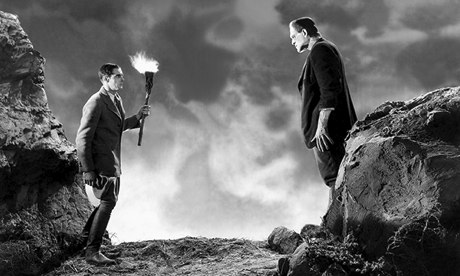
In the volume I of the Frankenstein by Mary Shelley the story let us know the motivations of the experiment of Victor Frankenstein and the horrible creature created as a result. First, we see Victor Frankenstein gathering the information for his scientific cause the “creation of life”, looking for information from teachers at the University of Ingolstadt and developing his skills for to accomplish his experiments. After two years of study and labor Victor Frankenstein success in the creation of the creature. We can perceive Victor Frankenstein as an insecure person incapable of assume the consequences of his
experimentation’s because he hides from his creation letting the living being abandoned. In a moment of remorse for his actions Victor Frankenstein try to get back to Geneva to his family and friends finding that his brother William has been killed. For this Justine Moritz a servant for the Frankenstein house was accused, condemned and executed by mistake.
On the second Volume of Frankenstein, we can perceive the sense of guilt of Victor Frankenstein for not to reveal the truth about the dead of his brother and the execution of an innocent person. On Mouth Blanc, Victor Frankenstein met the monster and we start reading the story from the point of view of the creature. He describes the process and the difficulties that he experience from the moment of his birth. He describes his first moments on this world, his senses and his fears. During this Volume the Monster tells Victor about how he has to develop an ability for to survive, how he discovers fire and how he uses for to cook his meals, one of the parts that really cached my attention was when after the creature learned to read and started questioning about his existence and his origin, he realized that he was like Adam (p.105) created by a god with no link with other living creature. This is the point where the creature discovers the papers from the Frankenstein’s laboratory in his pocket and interprets the symbols and the notes given. At this moment the creature decides to approach the family looking for protection but only he finds rejection. As a consequence the monster decides to run after his creator and starts his journey to Genève where he tastes the pain of being shot as a reward for saved a girl.
The Volume II coming to an end when the creature relates to Frankenstein the reason why he killed William Frankenstein in the woods. During this transition to the Volume III the mood of the creature changes, it’s no more the innocent creature from the beginning of the Volume II, he is full developed in his senses and his objectives are clear: he doesn’t want to be alone in this world anymore and he wants revenge from his creator.
Victor Frankenstein in the Volume III stars a journey across Europe. The motivation for this journey according to Frankenstein is to prepare and gather the information for the preparations destined to the creation of the female companion to the creature. For this porpoise Frankenstein takes his time, travels across Europe and stars feeling hesitant about the accomplishment of his promise to the creature. He expects that the time past and something random could happen to the living being. He starts guessing about the creation of a new female creature and the possible bad outcome to this process. Frankenstein feared about a new race of uncontrollable “devils” (p.138). The creature that have followed Victor Frankenstein during his journeys saw the destruction of his female being and promised revenge on the night of Victor’s wedding: “I shall be with you on your weeding night” (p.140). After abandon his project Frankenstein decides to leave to Switzerland and start his fleeing in a small boat in the middle of the night. The boat is carried away to a near island where he is imprisoned, accused for the dead of Henry Clerval. After a couple of moths Frankenstein is cleared of the homicide of his friend and benefactor and goes back to Genève in company of his father. In Paris he receives a letter from Elizabeth and he decides (no matter the promise of the creature) to marry her. On his wedding night Frankenstein hears the scream of his wife and he found her dead, killed by the creature. The notice of the dead of Elizabeth leads to the dead of his father. As a consequence Victor Frankenstein began the chase of the creature for all across Europe and ended in the Arctic Ocean near Russia where he dies from sickness. The creature appears in front of his dead body and had a conversation with Mr. Walton where he reflex about his motivation for his crimes and end with his vengeance and then vanishes in the ice.
The character of the creature really gained my sympathy from the beginning of the story. From the point of his creation the creature really suffered but he was adaptable to difficult situations. The creature has unique characteristics that made him a super human or more human than his creator: He possessed physical abilities like he’s supernatural strength; he’s rapidly learning skills and he’s ability for to resist extreme weather conditions. But the creature share with the humans their emotions and his emotions where augmented as his physical strength that may be made the creature not to reason clearly and commit the homicides. For me the creature was born well but the society and the human world molded him and turned him evil.
- Every time when Victor Frankenstein are supposed to take responsibility for his actions during the story he got sick. Do you think the lack of responsibility of Victor Frankenstein was a decisive factor in the story?
- According to the text the human beings are created according with the characteristics of his creators. There are similarities between Victor Frankenstein and the Monster?

